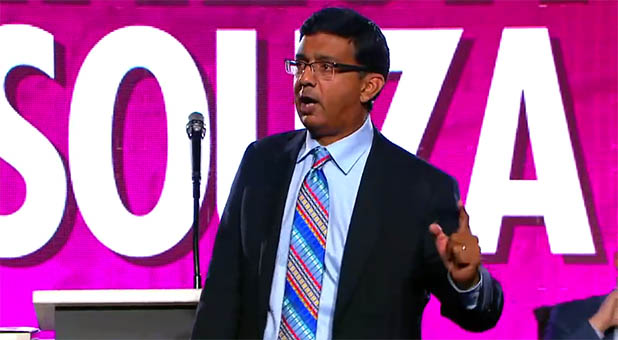Dinesh D’Souza Dropped the Mic on ‘Never Trump’ Christians
Best-selling author, documentary filmmaker and accomplished debater Dinesh D’Souza spoke at Liberty University’s Convocation, and he had an important message for the students—many of whom have been critical of their university president of late.
While much of the discussion focused on the subject matter of his newest book, What’s So Great About Christianity, he also took the time to address the matter of Christians’ responsibility to vote. It was, for lack of a better term, what the students themselves would’ve called a “mic drop.”
There is a distinct difference between intentions and consequences, he said. And while a Christian might act out of the purest of intentions, it can still result in terrible consequences. He used the struggle of the abolitionist movement in the mid-1800s as his example, saying abolitionists—until they aligned with the Republican Party—spent much of their time burning copies of the Declaration of Independence and Constitution and criticizing the Founding Fathers for allowing slavery to begin with.
And even when they achieved their greatest victory, they did so with a president—Abraham Lincoln—who himself was not an abolitionist.
D’Souza then turned his speech to the topic of the 2016 presidential race. Those who choose not to vote in the 2016 election, are still—in essence—voting for Hillary Clinton, he said.
“You need to know that a vote for Hillary Clinton is a vote to swing the balance of the Supreme Court, virtually irrevocably, against us,” he said. “A vote for Hillary Clinton is a vote to not only permit, but bring in federal subsidies for abortion. A vote for Hillary is a vote to put religious freedom, already precarious, into a much more endangered position, because the checks and balances of what would normally block the government are themselves being eroded. And you are voting for a regime in which justice becomes increasingly discretionary, as I saw terrifyingly in my own case.
“In Hillary’s America, I think it is an illusion to think that we as conservatives, as Christians, can retreat into our private spaces, drive our pickup truck to school or work, pray in church, and they will leave us unmolested. They will not do that. They have no intention of doing that.
“In a democratic society, as Christians—think about it, how did we lose the media? Not enough of us got involved. How did we lose academia? Not enough of us went to those schools. How did we lose Hollywood? Not enough of us make movies. We gave up that territory, and then we pretend to be shocked when they use their power to beat the heck out of us.”
D’Souza said that in the nearly 40 years since Ronald Reagan was elected president, American politics has, more or less, been balanced. But if Clinton is elected, “this ship is likely to go one side up,” creating a very different America for everyone, especially evangelical Christians.
“We’ve seen the latest WikiLeaks emails,” he said. “In them you see the kind of bigotry that the Democrats will indulge in privately against evangelicals, against Catholics. When you listen to it, you ask yourself this question: ‘Will they ever say that about a Muslim?’ Never.
“So, there is a selective prejudice in our society. It’s already there. It’s already in the culture. But to import to the highest level of politics—it’s one thing if it happens anyway and we fought it and we lost, but for us to collaborate with them? To make it easy, to make it happen? This is why the English phrase was invented, ‘Askin’ for it.’ For us to do that, in my opinion, is to ask for it.”
D’Souza closed out his speech by telling the students he didn’t want to tell them what to do. And by nature of his imprisonment for campaign finance violations, he also can’t tell them to follow his example. So instead, he turned to their critical thinking skills:
“I urge you to think critically,” he said. “I urge you to weigh the options. I ask you think about the American Dream, handed down to us from generation to generation, and ask what can you do preserve, protect, and defend that dream.
“In the immortal words of the ’60s—I’ll close with that saying from the 1960s, ‘If not now, when? If not us, who?'”














































